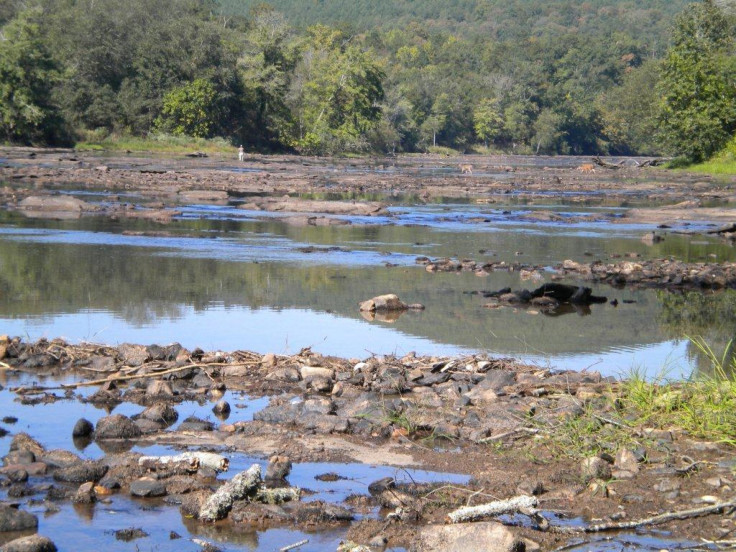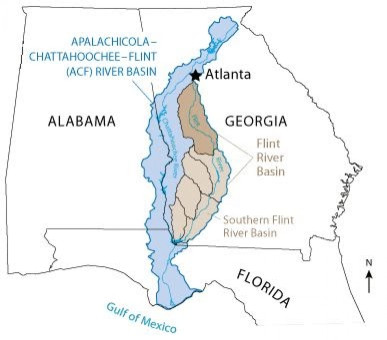Water Wars In The U.S. South: Fighting To Keep The Flint River From Going Dry In Georgia And To Save Apalachicola Bay

When Gordon Rogers was born in Atlanta in 1959, the modest city and its suburbs were nothing like the urban expanse where he lives today. As a result of rapid and sustained growth -- critics elsewhere deride Atlanta as “the city that ate Georgia” -- Atlanta and its ever-expanding suburbs have guzzled up everything in sight. First it was land; now it’s water.
Increasingly, the city’s withdrawals from the rivers and reservoirs of northern Georgia are depriving downstream residents of their share of water for drinking, development and environmental health. As an advocate for the Flint River, Atlanta’s neighbor, Rogers is working to restore the picturesque river’s flow before low water levels cause irreversible economic and ecological damage throughout the state. The fight to save the Flint is a less-heralded part of a much larger, decades-long tristate water war that pits Atlanta -- and its massive population growth -- against much of the rest of Georgia as well as sections of Alabama and Florida.
Atlanta’s metropolitan area encompasses more than 5 million people and 8,000 square miles, and, crucially, it lies near the headwaters of several rivers and major streams. It also uses water from two federal reservoirs just north of the city that are intended to control water flow all the way down to the Gulf of Mexico. Critics contend that Atlanta is increasingly monopolizing water supplies that should be going to communities south and west of the city and that certain critical ecosystems, like the Apalachicola region in the Florida Panhandle, are collapsing from a lack of fresh water.
One of several rivers that have lost a substantial amount of water in recent years, the Flint -- No. 2 among “America’s Most Endangered Rivers 2013,” according to the conservation-minded American Rivers -- runs nearly 350 miles from just south of Atlanta to Lake Seminole on the border with Florida. As it wends its way south, the Flint is an economic boon to the communities along its banks, where fishing and paddle sports draw tourists who buoy local businesses and property values. Downstream, the river is integral to industry and energy. And in southern Georgia, the Flint is the lifeblood of a multibillion-dollar agriculture business with some 10,000 farms.
All this activity means that by the time the Flint reaches its mouth in the Lake Seminole reservoir, a lot of water has been swallowed up by Georgian communities. This is a particular problem for Florida’s Apalachicola River, which runs from Lake Seminole to the Gulf Coast and empties into Apalachicola Bay, where depleted water flows are threatening one of the world’s most diverse estuaries and a community that has built a way of life around oysters and vacation homes. Indeed, much of the noise surrounding the tristate water war has been about the peril to Apalachicola.
Rogers said that although the “Atlanta lobby” -- as he calls business and government interests that support Atlanta’s water-consumption rights in this debate -- “has successfully cast the argument as looking at it through a Florida-line lens,” that view is myopic.
“I dispute that Atlanta’s interest is necessarily Georgia’s interest,” he said.

With drought threatening Atlanta’s water supply in 2008, two members of Georgia’s congressional delegation revived a decades-old proposal to build reservoirs on the upper Flint, which would limit flows to communities downstream. The threat to the river spurred the creation of the Flint Riverkeeper group that year, which brought together stakeholders from up and down the Flint dedicated to protecting the river. Rogers serves as the group’s executive director and in the post of riverkeeper. The group is lobbying the state’s Legislature and regulatory agencies to try and preserve the health of the river. If those efforts fail, it has a legal strategy prepared to defend the river in court.
“There are some areas that are immediately downstream of Atlanta that are really suffering,” Rogers said. “The ability to use the river by property owners downstream from Atlanta, I’m not exaggerating, it’s just evaporated.”
This year, Georgia has seen heavy rainfall after years of drought, but the river is still not flowing strong. Drought years, increasingly frequent, sometimes reduce portions of the river to dry dirt. Businesses and property values, as well as the ability to generate energy, have taken a hit in upstream communities. “I have landowners -- people on my board, people in our general membership -- that have been fishing and paddling in front of their family property, some of these guys are 80 years old, 82, 83 years old, literally all their life. And that’s been taken away from them. That’s the effect. Where there once was a river even during droughts, there is now not a river,” Rogers said.
Farther south, rainwater and more tributaries help offset some of the effects of Atlanta’s water consumption. But, in southwestern Georgia, industrial agriculture draws heavily from the river to irrigate corn, cotton and peanut crops, depleting the river again downstream.
To protect the river, the group is urging the state Legislature to revise the Flint River Drought Protection Act, which allows the state to pay farmers in southern Georgia not to irrigate their land during drought years, so that the act protects the whole river. The group hopes that the state Environmental Protection Division, run by Director Judson H. Turner, will be an ally in pushing for at least incremental protections for the entire river. In a set of written responses to questions, EDP’s communications office said it “does not make sense” to expand the act to include the whole river, but that studies commissioned by a revised version of the law, if it passes, “will point us toward and support some set of whole basin approaches in the next 3-5 years.”
If the Flint Riverkeeper’s legislative and regulatory efforts to save the river fall apart, the group is prepared to go to court. In a letter to EPD’s Turner in February, the group laid out two legal cases it will use as a last resort. The first case would challenge the state’s allotment of the Flint’s water under state law, charging that the large withdrawals for Atlanta and big agriculture violate the right of all Georgians along the river to make use of the water. Current water allocation has “created winners and losers in the regulatory system: It’s disadvantaged some while it’s advantaged others,” Rogers said. “It’s a pretty straightforward legal argument.”
Rogers also discussed the issue in terms of the property rights of the landowners along the river. “It’s taken their property rights away,” he said. “Of course, in a red state, that’s a red flag, you know. People get really ticked off when somebody takes their property rights away.”
The second case prepared by the group would be pursued in federal court: It would charge the state with violating the Endangered Species Act by allowing overuse of the river to the point that it is killing the endangered species that live in the Flint. Rogers conceded that this second case, if brought to court, would turn public sentiment against the group because it puts “man against critter.” But the board of Flint Riverkeeper isn’t afraid of being called “liberals,” he said, characterizing the board members politically as akin to Rush Limbaugh in their conservative views “They’re about getting water back in the river and using whatever tool it takes.”
On the other side of the issue are those who prioritze Atlanta’s water supply over the health of the river downstream, including U.S. Rep. Lynn Westmoreland, one of the two congressman who wanted to build dams on the upper Flint in 2008. Although that proposal is dead now, Westmoreland, a Republican, said at the time that damming the river could provide a “permanent fix” of Georgia’s water-supply problem. He now represents several of the counties in the southern metro Atlanta, but he declined to comment for this article on the current debate over the future of the river.
Rogers and his colleagues recognize that the state cannot give preferential treatment to the relatively small communities that populate the Flint over the well-being of the Atlanta region and the farming industry in the south. “We have massive economies that have grown up, built up around these legitimate water uses,” Rogers said, added that fueling Atlanta in the north and agriculture in the south are “positive uses of this water for society.” The problem is that the water use is “overallocated” and “out of control,” he said.
“It’s people,” Rogers said, summarizing the problem in two words. “It’s the miracle of the Southern economy that’s caused all this, and I watched it happen. I have watched the South change before my eyes. Some of it’s great. Certainly our civil-rights history needed to be changed, without a doubt. But some of it’s not so great.” The situation reminds Rogers, he said, of “Pogo,” an old comic strip about animals in the Okefenokee Swamp on the Georgia-Florida line. “Pogo, he’s a possum. He had an old saying, that ‘we have met the enemy and he is us.’ And I think that’s just the truth.”
© Copyright IBTimes 2025. All rights reserved.






















